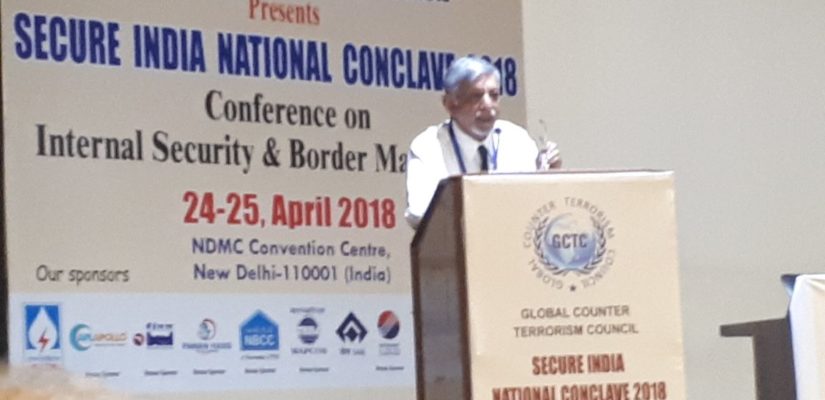
Pak exposing its hands of blood in Kashmir Khabarhub (Nepal) 08 Aug 19
Pak exposing its hands of blood in Kashmir Khabarhub (Nepal) 08 Aug 19
Post the Indian government’s announcement of abrogating Article 370 and converting J and K into two Union Territories (UT) there were objections by Pak. The major reason was that Indian actions changed the structure of J and K and made it almost out of range of discussions with Pak. What rattled Pak more was that for the first time in decades, it had felt it was on the high ground for talks on Kashmir.
Trump’s offer to mediate, given during Imran’s recent visit to the US, was taken very seriously by Pakistan to the extent that Qureshi, their foreign minister stated after meeting the PM of Pakistan Occupied Kashmir (POK) that they discussed modalities on implementing the offer of Trump to mediate. In desperation Qureshi also added, when asked of Indian objections on the offer, ‘India neither considers third party arbitration on the Kashmir issue nor is ready for bilateral talks.’
Pakistan also thought that with improving relations with the US, talks between the Taliban and US special representative to Afghanistan, Khalilzad, reaching a crucial stage, it could pressurize the US into mediation. Qureshi even attempted to link peace in Afghanistan to talks on Kashmir. Pak has repeatedly stated that peace in Afghanistan flows through Kashmir. It hoped to achieve all this without turning off the terrorism tap.
For seventy years Pakistan has been teaching its children that the nation survives only for Kashmir, which rightfully should have been a part of Pak, grabbed by India and that the Pak army needs funds and power to counter threats from India. Thus, hatred towards India was part of Pak upbringing. Only Kashmir and enmity with India would compel its people to forget their financial misery and unite as one. With one announcement, India had changed the narrative.
Pak had to act and do so to satisfy its masses more than to counter Indian actions. It also had to take actions, which could cause some worries around the globe. The aim was also to cool down tempers of the opposition which went on the offensive against the failure of the government. Thus, it took five steps.
It reduced diplomatic ties by returning the Indian High Commissioner and delaying the arrival of its own, stopped bilateral trade and ordered a review of bilateral arrangements. It also sought to approach the UN Security Council and declare 14 Aug as Kashmir solidarity day and 15 August as black day. The announcement of closure of airspace was done later.
Simultaneously, the Pak army announced all actions to support the Kashmiris in their struggle. There are also reports that Pak plans to shift forces from the Afghan border to the LoC. While most actions are posturing and seeking to satisfy domestic audiences, the shifting of forces is to apply pressure on the US.
Unstated is the fact that Pak would now seek to push in Al Qaeda militants into Kashmir, claiming them to be members of the AQIS (Al Qaeda in the subcontinent). In addition, it would resort to expanding its disinformation campaign in Kashmir, hoping to incite violence, which could subsequently be projected across the globe as a sign of resistance to Indian decisions.
Pak continues to remain under pressure from the FATF. The US assistant secretary of state, Alice Wells, warned Pak on its actions to implement FATF guidelines. She stated that unless Pak indicates seriousness in action, it may never exit the Grey List. The IMF representative in Pak, Teresa Daban Sanchez, stated that remaining in the Grey List would impact the recently concluded IMF deal. Hence, it must tread carefully even now.
Pak remains aware that there is not much it can do to get India to reverse its decision. The world has generally stood by India or ignored its actions. China has objected to Indian decision on Ladakh and not Kashmir. UAE and Maldives, two countries of the OIC, have supported India. The US has washed its hands off. France would stand by India. Legally, Pak had acted in a similar manner with Gilgit Baltistan and hence approaching international courts is not an option.
India was expecting Pak reactions. It has decided to ignore Pak’s actions and comments, only stating that its decisions are its internal matter and hence no nation can object. More important for India is to ensure that the benefits of the decisions are spread across the community in Kashmir, reducing any levels of violence post the lifting of restrictions.
International comments would flow on how the decision is accepted in Kashmir and how the Indian government retaliates. This is the main test. This is what India is preparing for, spreading the word, convincing the population that the actions are a benefit, rather than a loss. The question is to watch how it fans out in the days ahead.